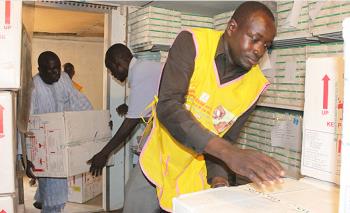|
The Ministry of Health in Kenya that will be responsible for maintaining the inventory of Ebola vaccine has developed a rapid response team encompassing laboratory diagnostic specialists and members with experience in logistics and delivery of vaccines. The Ministry has a total  workforce of 229 staff deployed at various points of entry into Kenya and has designated 21 Ebola specialists to be activated in the event of an outbreak that is almost inevitable. workforce of 229 staff deployed at various points of entry into Kenya and has designated 21 Ebola specialists to be activated in the event of an outbreak that is almost inevitable.
The decision to maintain an inventory of vaccines and to train responders is justified by the high mortality and social disruption caused by the disease. Selected first responders in the U.S. have received the vaccine and have developed contingency plans following the 11 cases in the U.S. in 2014 comprising seven medically evacuated personnel and four contact cases.
The principle of stockpiling vaccines against both human and livestock diseases should be a major consideration with the respect to exotic infections many of which have catastrophic consequences following introduction into naive populations. Unfortunately, stockpiles cost money to acquire and to maintain and inevitably must be replenished as a result of aging.
The slow pace of administration of available COVID vaccine demonstrates the need for planning, distribution and administration to populations, herds and flocks. Fortunately, in the case of livestock, they are generally concentrated on farms and in limited geographic areas facilitating administration. Fortunately, animals and birds do not have access to the internet and do not have prejudices regarding political, religious and social concerns and are easy and available recipients. Avian Influenza H5 and H7, Foot and Mouth disease and when available African swine fever are obvious candidates with funds allocated for Foot and Mouth disease.
|